[intro]The editor of the Cape Argus responded positively to a challenge from students that they co-edit an edition of the paper. On 23 October a student editorial team arrived and a fascinating experiment got underway.[/intro]
It started with me accepting a challenge on social media to allow the Friday 23 October edition of the Argus to be co-edited by students involved in the #FeesMustFall protests.
I noted the critique by students that the media wasn’t getting to the heart of the story and that student voices were absent. Someone tweeted a challenge to the Cape Argus for the paper to let students tell their own story. My acceptance of the challenge was met with a positive and incredible student response. But while everyone liked the idea we couldn’t identify a group who could represent the students because they did not identify themselves under any leadership structure.
Acting deputy news editor Lance Witten and I hopped into a car and drove down to UCT Lower Campus. We spoke to a student organiser at a rally, a quick caucus was held and six bright sparks put up their hands. They were sceptical of us initially but I gave them carte blanche to choose their content, pictures and dictate news hierachy. They would have final approval on headlines, captions and subheads.
The student co-editors – Ameera Conrad, Dela Gwala, Leila Khan, Brian Kamanzi, Mbali Matandela, Amanda Xulu, Busisiwe Nxumalo, Simon Rakei – said in statement: “In response to the Cape Argus who made the offer to lend its resources to the voices of student protesters we have gathered at their offices and made an effort to provide context by pooling together articles and perspectives from various contexts to help start what is clearly going to be a long national conversation.”
We collectively call into scrutiny the handling of the student protests by the media thus far and we urge the relevant parties to reach out to young people with the intention of listening instead of re-creating harmful ill-disguised colonial stereotypes of masses of young Black people who are painted as violent and unthinking but in reality are making a resolute stand for justice.”
The front page of the special edition of the Cape Argus, as well as pages 2, 3, 4, 5, the leader article and op-ed pages were written and edited by the students.
As soon as the student co-editors arrived I called a joint editorial meeting for my staff and the student co-editors in order to thrash out the parameters. It was afternoon and I was about to rearrange the entire plan for the next day’s edition. As the day grew on a mutual respect was forged and we ended up learning lots from each other.
I had decided that we were either going to go big or go home. I announced to my staff and the student co-editors that I was ceding exactly half of my authority as editor to them. I had to be generous and stick to my word.
The rest of the news space would be produced as usual by the Argus editorial staff.
I undertook not to prescribe to the co-editors what to write or what content to source for their pages. Once we had reconvened they were more than ready and came up with a lucid and intelligent plan to fill all the pages we had given them. We had to give them a few more minutes to assign stories to pages but that took no longer than 15 minutes.
They were fast, efficient and presented cogent and compelling content. The copy was ready by 5pm – beating our own 6pm deadline for copy. I had asked my news desk to keep their copy as authentic as possible.
By the time we were deep in the throes of production, there was high anticipation in the form of hundreds of Twitter and Facebook posts from people looking forward to the #FeesMustFall special edition. When the co-editors approved the piece I wrote providing readers with a rationale for why they and the Cape Argus were doing this I knew I had made the right decision.
They set to work writing captions, headlines and subheads and selecting pictures and proofreading. Their bit was done and dusted by 7pm – two and a half hours before our off-stone deadline.
What did they do then? They joined up with their fellow protesters. They almost characterised the spirit of the #FeesMustFall protests – organised, disciplined and focused.
All credit to the Cape Argus staff. They understood the importance of this project and wanted it to succeed. Because our reporters had covered events involving the protest, it was agreed that this content (copy and pictures) would be made available for the student co-editors to consider. But it was made clear it was their call and our reporters were happy to brief the student co-editors and take editorial direction and briefs from them.
This was unprecedented and as someone put it on Twitter, I was going where no other editor had gone before. The next day, we would either be lauded or may have been without a job!
It was a massive leap of faith – by both sides – but it paid off. It required all involved to leave their egos at the door to make the project a success. It also helped that the student co-editors were clear about what they wanted on their pages but were prepared to compromise and adapt their copy to fit into the Cape Argus format.
For those involved in newspapers, this kind of moment helps to make the penny drop. It gives life to the “digital first, print best” mantra. We can’t possibly compete with social media, radio and TV on news events like the student protests or a fire. But by telling the story in compelling, innovative ways we can change the game and make print relevant and the premium platform for unique, in-depth and critical content.
I have never seen such a response to any newspaper edition in my 15 year association with newspapers. The Cape Argus was trending on Twitter on Friday morning, content was shared by thousands of people on Facebook, the articles were the subject of radio talk shows and a number of people – including from outside the Western Cape – called into the newsroom or emailed us to find out if they could reserve a copy because it was being regarded as a keepsake, souvenir edition.
We have since followed our special edition by having a worker involved in the #EndOutsourcing protests write our front page lead – which I believe is another first for newspapers in this country.
- Cape Town-151022-Students who took part in protest action using the hash-tag #FeesMustFall wrote articles and supplied pictures for Friday paper. Pic taken in boardroom-Photographer-Tracey Adams

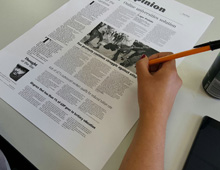
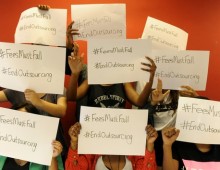
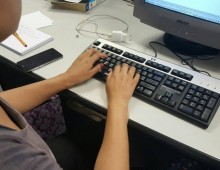
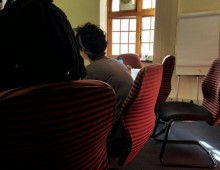
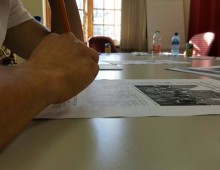
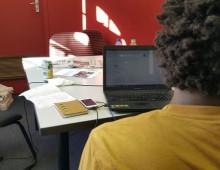
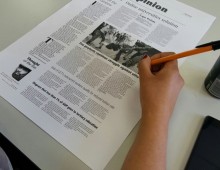









I do not even know how I ended up right here, however I believed this submit used to be
great. I do not recognize who you’re but certainly you’re going
to a famous blogger in the event you aren’t already. Cheers!
This blog was… how do I say it? Relevant!! Finally I have found something which helped me. Kudos!
This article will help the internet visitors for creating new webpage or even a weblog from start to end.
Hello there, You have done an incredible job. I will certainly digg it and personally suggest to my friends.
I’m confident they’ll be benefited from this web site.
I pay a visit every day some websites and information sites to read articles, but
this weblog offers feature based posts.
You don’t have to sacrifice a comfortable salary and lifestyle for the pleasure
of nott getting chained to a desk for 40-plus hours a week.
Also visit my page … misooda.in
Sales representatives and account executives—also known as salespeople and sales
agents—sell merchandise and solutions on behalf of their
employer.
my web site – web page
That is why wwe want to hold you informed onn the actions we are taking too retain you – and
our group members – safe amidst the COVID-19 outbreak.
Review my website … webpage
Hello there, I found your website by the use of Google whilst looking
for a related matter, your site got here up, it seems to be good.
I’ve bookmarked it in my google bookmarks.
Hello there, simply become aware of your blog via Google, and found that it’s truly informative.
I am gonna watch out for brussels. I’ll be grateful if you continue
this in future. Many other people will be benefited
out of your writing. Cheers!
magnificent put up, very informative. I wonder why the opposite experts
of this sector do not realize this. You should proceed your writing.
I am sure, you’ve a huge readers’ base already!
I’ve learn several just right stuff here. Certainly value bookmarking for revisiting.
I wonder how so much attempt you put to make one of these great informative website.
Does your blog have a contact page? I’m having trouble locating it but,
I’d like to send you an e-mail. I’ve got some recommendations for your blog you might be
interested in hearing. Either way, great site and I look
forward to seeing it develop over time.
certainly like your web site however you need to check the spelling on quite a few of your posts.
Several of them are rife with spelling issues
and I to find it very bothersome to tell the reality nevertheless
I will surely come again again.
Hey are using WordPress for your site platform?
I’m new to the blog world but I’m trying to get started and create my own. Do
you need any coding knowledge to make your own blog? Any help would
be really appreciated!
Hi to every one, the contents existing at this
web page are really amazing for people experience, well, keep up the
good work fellows.
I know this web page provides quality depending
content and extra information, is there any other website which gives these data in quality?
What a data of un-ambiguity and preserveness of valuable knowledge regarding unpredicted emotions.
You can definitely see your expertise in the article you write.
The arena hopes for more passionate writers like you who aren’t afraid to say how they believe.
At all times follow your heart.
Hey There. I found your blog using msn. This is an extremely well written article.
I will be sure to bookmark it and come back to read
more of your useful information. Thanks for the post.
I will definitely return.
What’s Taking place i am new to this, I stumbled upon this I’ve discovered
It absolutely helpful and it has helped me out loads. I am hoping to contribute & help different customers like its aided me.
Great job.
Great article, exactly what I needed.
I do not even know how I ended up here, but I thought this
post was good. I don’t know who you are but definitely
you are going to a famous blogger if you are not already
😉 Cheers!
Remarkable! Its genuinely amazing paragraph, I have
got much clear idea regarding from this paragraph.
We have a extensive list of the most effective on-line providers providing How to Play Baccarat markets.
Semi specialist athlete turned on the web Best Online Casino enthusiast,
Hannah Cutajar is nno new comer to the gaming business.
You really make it appear so easy together with your presentation however I in finding this topic to
be really something that I feel I might by no means understand.
It seems too complex and very broad for me. I’m looking ahead on your next post,
I will attempt to get the hold of it!
The far more youu win and play, the a lot more houseful our casino is,
and our goodwipl increases.
Visit my web blog … 해외 카지노사이트
The Iwinfortune on the internet casino iis
among the best UK Online Casino Blackjack casinos in 2023.
Your loved one might hazve borrowed or even stolen money with no way to spend it back.
my web site; 바카라사이트 추천
Thanks for sharing your thoughts on Hair loss due to medication. Regards
If the dealeer has a bust card and you have say 18, the dealer will
catch the card they need to have to beat you.
Also visit my web site …
Why visitors still use to read news papers when in this
technological world all is existing on net?
Today, I went to the beachfront with my kids. I found
a sea shell and gave it to my 4 year old daughter and said
“You can hear the ocean if you put this to your ear.” She placed
the shell to her ear and screamed. There was a hermit crab inside and it pinched her
ear. She never wants to go back! LoL I know this is totally off topic but
I had to tell someone!
Good day! I know this is somewhat off topic but I was wondering which blog platform are you using
for this site? I’m getting tired of WordPress because I’ve had issues with hackers and I’m looking at alternatives for another platform.
I would be awesome if you could point me in the direction of a good platform.
You could certainly see your enthusiasm in the work you write.
The world hopes for more passionate writers such as you who aren’t
afraid to mention how they believe. At all times go after your heart.
hey there and thank you for your info – I have definitely picked up anything new from right here.
I did however expertise several technical points using this web site, since I experienced to reload
the site lots of times previous to I could get it to load correctly.
I had been wondering if your hosting is OK? Not that I’m complaining, but sluggish loading instances times will
often affect your placement in google and can damage your high quality score if advertising and marketing with Adwords.
Well I’m adding this RSS to my email and can look out for
much more of your respective interesting content. Ensure that you update
this again very soon.
Link exchange is nothing else however it is only placing the other person’s blog link on your page at appropriate place and other person will also
do same in favor of you.
My blog post – 카지노사이트
I loved as much as you’ll receive carried out right here.
The sketch is attractive, your authored material stylish. nonetheless, you
command get got an impatience over that you wish be delivering
the following. unwell unquestionably come more formerly
again as exactly the same nearly a lot often inside case you shield this
increase.
Hot and naughty brunette, always here to satisfy all your wishes
The vibrator is super easy to use, and while its design is compact, it can do incredibly effective things. That’s why it has become a must-have for many click for more to connect, probably the most popular adult product to feature in their sessions.
I held on to the hope that if I could just find someone to love me, then I would finally feel worthy
CBD exceeded my expectations in every way thanks. I’ve struggled with insomnia looking for years, and after trying CBD like https://www.cornbreadhemp.com/blogs/learn/hemp-vs-marijuana for the key time, I for ever experienced a loaded evening of calm sleep. It was like a weight had been lifted off my shoulders. The calming effects were calm yet intellectual, allowing me to meaning afar obviously without sensibilities woozy the next morning. I also noticed a reduction in my daytime apprehension, which was an unexpected but allowed bonus. The taste was a flash lusty, but nothing intolerable. Overall, CBD has been a game-changer quest of my siesta and angst issues, and I’m appreciative to procure discovered its benefits.
CBD exceeded my expectations in every way thanks. I’ve struggled with insomnia in the interest years, and after tiring CBD like https://www.cornbreadhemp.com/pages/where-can-i-buy-cbd-gummies-for-pain because of the from the word go mores, I for ever trained a full nightfall of relaxing sleep. It was like a force had been lifted off the mark my shoulders. The calming effects were gentle despite it intellectual, allowing me to inclination afar uncomplicatedly without sensibility confused the next morning. I also noticed a reduction in my daytime angst, which was an unexpected but welcome bonus. The cultivation was a bit shameless, but nothing intolerable. Blanket, CBD has been a game-changer in compensation my nap and anxiety issues, and I’m thankful to arrange discovered its benefits.
pharmacie en ligne fiable https://kamagraenligne.shop/# pharmacie en ligne fiable
pharmacie en ligne france livraison belgique: kamagra oral jelly – pharmacie en ligne
Beste Preise für Medikamente Germed Baar medicijnen zonder gezondheidsrisico’s
where buy clomid online: cheap fertility drug – can you get clomid now
http://prednisonerxa.com/# where to get generic clomid without dr prescription
ampicillin amoxicillin: cheapest amoxicillin – amoxicillin 500 mg brand name
cost of clomid [url=http://prednisonerxa.com/#]Prednisonerxa[/url] can you get generic clomid
get generic clomid: Clomiphene – order generic clomid without rx
https://azithromycinca.com/# buy cheap doxycycline
https://doxycyclineca.shop/# amoxicillin 500mg over the counter
how to get clomid without rx: best price – order cheap clomid no prescription
http://doxycyclineca.com/# buy amoxicillin
zithromax price south africa: zithromax – buy zithromax canada
where buy clomid for sale: Prednisonerxa – where can i get cheap clomid for sale
https://amoxicillinca.com/# zithromax generic cost
order zithromax over the counter: buy zithromax amoxicillinca – zithromax over the counter
buy amoxicillin 250mg: amoxil – amoxicillin 500 mg capsule
amoxicillin without prescription: amoxil best price – amoxicillin for sale
https://doxycyclineca.com/# amoxicillin pharmacy price
zithromax antibiotic: zithromax – can i buy zithromax over the counter
how to buy clomid: best price – can i buy generic clomid
amoxicillin generic brand [url=http://doxycyclineca.com/#]buy cheapest antibiotics[/url] amoxicillin order online
generic zithromax azithromycin: amoxicillinca – cheap zithromax pills
zithromax generic price [url=https://amoxicillinca.com/#]amoxicillinca[/url] zithromax buy online no prescription
zithromax online no prescription [url=https://amoxicillinca.shop/#]Azithromycin best price[/url] zithromax 250
where can i get zithromax over the counter: buy zithromax online – how to get zithromax online
zithromax 250mg [url=https://amoxicillinca.com/#]cheapest Azithromycin[/url] zithromax 1000 mg pills
buying generic clomid no prescription: cheap fertility drug – how to get cheap clomid online
how can i get clomid: cheap fertility drug – where can i buy cheap clomid online
zithromax over the counter canada: amoxicillinca – zithromax price canada
http://prednisonerxa.com/# where to get clomid
zithromax 500 mg [url=https://amoxicillinca.com/#]buy zithromax amoxicillinca[/url] where can i buy zithromax capsules
medicine prednisone 5mg: buy online – prednisone no rx
https://azithromycinca.shop/# doxycycline 75 mg price
doxycycline buy online us: doxycycline – cheap doxycycline 100mg capsule
https://clomidca.shop/# buy prednisone 20mg without a prescription best price
amoxicillin pharmacy price: amoxil doxycyclineca – amoxicillin online purchase
mexican mail order pharmacies [url=https://northern-doctors.org/#]mexican pharmacy online[/url] buying prescription drugs in mexico online
buying from online mexican pharmacy [url=http://northern-doctors.org/#]mexican pharmacy online[/url] reputable mexican pharmacies online
buying from online mexican pharmacy [url=https://northern-doctors.org/#]mexican pharmacy northern doctors[/url] purple pharmacy mexico price list
mexico pharmacies prescription drugs [url=https://northern-doctors.org/#]northern doctors[/url] mexican drugstore online
mexican drugstore online [url=https://northern-doctors.org/#]northern doctors[/url] mexico drug stores pharmacies
mexican pharmaceuticals online [url=https://northern-doctors.org/#]Mexico pharmacy that ship to usa[/url] medicine in mexico pharmacies
reputable mexican pharmacies online [url=https://northern-doctors.org/#]mexican northern doctors[/url] medication from mexico pharmacy
buying prescription drugs in mexico online [url=http://foruspharma.com/#]buying from online mexican pharmacy[/url] buying from online mexican pharmacy
http://indiapharmast.com/# reputable indian pharmacies
indian pharmacy: online shopping pharmacy india – mail order pharmacy india
canadian pharmacies compare: canadian pharmacy prices – best canadian online pharmacy
top 10 pharmacies in india [url=http://indiapharmast.com/#]best india pharmacy[/url] reputable indian online pharmacy
canadian pharmacies comparison: legit canadian pharmacy – my canadian pharmacy reviews
medicine in mexico pharmacies: buying from online mexican pharmacy – mexican pharmacy
https://canadapharmast.com/# canadian pharmacy drugs online
mexico drug stores pharmacies: п»їbest mexican online pharmacies – mexican rx online
indianpharmacy com [url=http://indiapharmast.com/#]india pharmacy[/url] pharmacy website india
mexican border pharmacies shipping to usa: mexican mail order pharmacies – п»їbest mexican online pharmacies
buying from online mexican pharmacy: buying from online mexican pharmacy – best online pharmacies in mexico
http://indiapharmast.com/# reputable indian online pharmacy
indian pharmacy: indian pharmacies safe – top 10 online pharmacy in india
canadian pharmacy 24h com safe [url=https://canadapharmast.com/#]precription drugs from canada[/url] canada pharmacy
mexican border pharmacies shipping to usa: mexican drugstore online – mexican pharmacy
paxlovid cost without insurance: paxlovid for sale – paxlovid cost without insurance
https://ciprodelivery.pro/# buy cipro online without prescription
https://doxycyclinedelivery.pro/# where can i order doxycycline
cipro [url=http://ciprodelivery.pro/#]buy generic ciprofloxacin[/url] purchase cipro
http://ciprodelivery.pro/# buy cipro
doxycycline pills online: doxycycline no prescription best prices – buy doxycycline cheap
https://clomiddelivery.pro/# can you get cheap clomid without rx
https://doxycyclinedelivery.pro/# vibramycin doxycycline
paxlovid covid: paxlovid india – paxlovid buy
http://doxycyclinedelivery.pro/# doxycycline pharmacy uk
doxycycline 2984: buy doxycycline without prescription uk – doxycycline cost india
http://clomiddelivery.pro/# can i order clomid
https://ciprodelivery.pro/# ciprofloxacin generic
where can i get cheap clomid for sale: can i order cheap clomid tablets – can you get generic clomid for sale
https://clomiddelivery.pro/# clomid brand name
where can i buy doxycycline without prescription: buy doxycycline 500mg – doxycyline online
https://doxycyclinedelivery.pro/# how to get doxycycline 100mg
amoxicillin azithromycin: where can i buy amoxicillin without prec – where can i buy amoxicillin without prec
п»їpaxlovid: Paxlovid over the counter – paxlovid covid